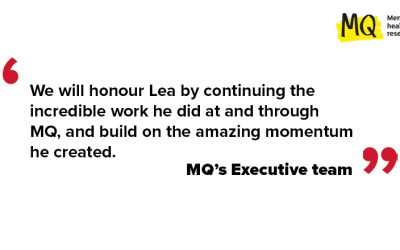People with severe mental illnesses die up to 10 years earlier than the general population. Their lives are scandalously cut short due to the tragedy of suicide as well as a disproportionately high rate of physical health problems with low detection. Too many people are gone too soon.
Now, a new paper published in the Lancet Psychiatry calls for action on a global scale to put an end to the growing mortality rates of people with mental illness and distress.
The paper, written by 40 global experts, followed an extensive road mapping process of evidence reviews and consultation with mental health researchers, clinicians, policy experts and people with lived and living experience of mental illnesses and suicide.

“Globally, too many people die prematurely from suicide and the physical health problems associated with mental illness and mental distress. These devastating losses are preventable,” says co-lead author Professor Rory O’Connor.
For this first time, we have brought together a multidisciplinary global team of academic, policy, clinical, and lived and living experience experts with the specific aim of understanding the driving forces behind these deaths together with what needs to be done to tackle this public health crisis."
Professor Rory O’Connor, Director, Suicidal Behaviour Research Lab, Glasgow University

“The Gone Too Soon road mapping process revealed cross-cutting factors behind mortality from both suicide and mental health comorbidities,” says Professor Carol Worthman. “We also discovered that many of these factors operate across the social-ecological spectrum, from individuals through families, communities, and society.
These insights open possibilities for common solutions that reduce premature mortality from both suicide and comorbidities and suggest opportunities to leverage ramifying effects via strategic interventions."
Professor Emerita Carol Worthman, Professor of Anthropology, Emory University, Atlanta
The group mapped the range of factors which increase the risk of early mortality for people who are suffering from mental health conditions. These include adversities such as traumatic life events, unemployment, stigma and marginalisation, lack of meaningful societal relationships and poor access to healthcare, education, housing and income security.
The paper’s authors, led by Professor Rory O’Connor from Glasgow University and Professor Carol Worthman from Emory University in the USA , have a variety of different backgrounds and perspectives including lived and living experience of mental illnesses.
The recommendations
Together these 40 global experts have outlined 18 evidence-based recommendations for policy makers, business leaders and health workers the world over.
These recommendations are split into three categories:
| Integration of mental and physical care | |
| Solutions | Examples |
| 1. Eliminate silos in health care | Integrated primary youth mental health care services. Group therapy improves depression and HIV treatment |
| 2. Improve collaborative care models | Task-shared integrated collaborative care for patients with depression and diabetes or alcohol in South Africa |
| 3. Improve care-provider training, capacity-building | EMERALD multi-national programme. WHO EQUIP training programme |
| 4. Access to primary care services with capacity to treat mental and physical health problems | Integrating mental health therapy into primary care. RESHAPE stigma reduction for carers in Nepal |
| 5. Improve screening, early identification and treatment of comorbidities | Garrett Lee Smith Youth Suicide Prevention Programme. Portable MRI in LMICs |

“This review paper addresses both the problems and solutions related to premature death among people living with mental illness and distress. The equal collaboration between subject matter and lived experience experts have produced comprehensive, holistic and meaningful insights in the process of translating the available evidence into prioritised actions. I envision that this paper will inform equitable, accessible and effective prevention and intervention across the globe in the future.”
Benny Prawira – Global mental health advocate
| Prioritisation of prevention while strengthening treatment | |
| Solutions | Examples |
|
1. Policies to restrict access to lethal means and decriminalisation of suicide |
Banning pesticides in Sri Lanka |
|
2. Media/social media engagement to tackle stigma and prevent suicide |
Engagement of the Malaysian media community on safe reporting of suicide |
|
3. Policies targeting upstream factors to regulate tobacco & support adequate diet/nutrition |
WHO recommendations for tobacco cessation and management of substance use disorders |
| 4. Work-based interventions to promote healthy workplaces | Mental Health in the Workplace guidance |
| 5. Early intervention, education and public mental health awareness & training | Postnatal home visitation to support parenting and infant healthy development |
| 6. Community-based interventions, peer engagement |
Communities That Care Plus (CTC Plus): a community-based planning and implementation system for youth in US |
| 7. Improve access to effective treatments and personalised medicine | Access to psychosocial treatments for suicidal thoughts and behaviour |

"It's been a great honour for me to contribute to this paper and also to interact with everyone. This paper will go a long way to provide solutions to approach mental Illnesses with a more compassionate face"
Wilbroad Kabagambe – The Alive Again Foundation, Uganda
|
Optimisation of intervention synergies across social-ecological levels and the intervention cycle |
|
| Solutions | Examples |
| 1. Strategies to reduce stigma, discrimination, marginalization, gender violence & victimisation | Women-centred, advocacy and home-visitation programmes. Stigma reduction strategies |
| 2. Action to reduce income inequality, such as income support & acute cash transfers | National cash transfer programme in Brazil |
| 3. Increase investment in mental health | Investment in mental health and suicide-prevention saves lives and is cost effective |
| 4. Redesign health systems to focus on factors that cause illness & improve treatment | Integrated care for severe mental illness, Ethiopia. Guidelines for high-performing hospitals |
| 5. Harness digital opportunities & big data | Passive sensing on mobile devices to improve mental health services in Nepal. App co-design |
| 6. Better understanding of interplay between biomarkers & psychosocial risk factors | Cortisol-trauma relationship in suicide risk. Bio-markers of environmental risk factors in depression |
These recommendations are a practical roadmap for preventing early mortality. However, the authors recognise that this is an ambitious paper and the solutions must be implemented across all levels of society, including at a global political level.
The authors are also keen to make it clear that any solutions must be co-designed by people with lived and living experience of mental illnesses in order to be successful.

"From the very start, Gone Too Soon has prioritised the knowledge and expertise that comes from having lived and living experiences of mental illness,” says mental health campaigner and contributor to the paper, James Downs.
“As someone with longstanding serious mental illness, comorbidity, and suicidality, it has been meaningful to have an active role in this ambitious research alongside world-leading experts. By integrating experts by experience on an equal footing, we have aimed to create a fuller, more representative knowledge of the problems that underpin why people like me are likely to live shorter and more difficult lives as a result of mental illness. I hope the solutions we have proposed are more impactful as a result of lived experience being included in the project, and that we have set an example for how to co-produce knowledge and co-design more effective solutions together."
James Downs, MQ Ambassador and lived experience co-author
This paper was produced by MQ Mental Health Research and was made possible by funding from The William Templeton Foundation for Young People’s Mental Health.
You can watch the discussion webinar with Rofessor Rory O'Connor and other special guests on MQ's YouTube channel here.



